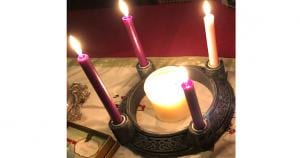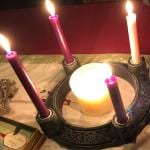Thy Nativity, O Christ our God, hath shined the light of knowledge upon the world; for thereby they that worshipped the stars were instructed by a star to worship Thee, the Sun of Righteousness, and to know Thee, the Dayspring from on high. O Lord, glory be to Thee.
 Putting out our crèche each year reminded us that Christmas in the cave where Jesus was born was (almost surely) crowded. If not, then it certainly was not alone time for the Holy Family. Bethlehem was a small town and very full. Any place with a manger had animals. Angels added voices to the sky and shepherds showed up to see the Baby. Our crèche prudently limits the shepherds to two, one old, the other young, but likely there were a good many more.
Putting out our crèche each year reminded us that Christmas in the cave where Jesus was born was (almost surely) crowded. If not, then it certainly was not alone time for the Holy Family. Bethlehem was a small town and very full. Any place with a manger had animals. Angels added voices to the sky and shepherds showed up to see the Baby. Our crèche prudently limits the shepherds to two, one old, the other young, but likely there were a good many more.
Angels are hard to ignore.
Later when the time came for the Lord Jesus to be circumcised, the Family drew attention again. Carrying Jesus meant not getting lost in the Temple crowd as Holy Symeon and Anna found the Savior of His people Israel. The return to Bethlehem was punctuated with the coming of the magi with the unwelcome addition of Herod and his troopers. Christmas ended with the family heading for exile in Egypt where at last we get years of (historically) silent nights. For a long time nobody but Mary and Joseph knew it was Christmas as the young Messiah’s birthday came around.
Still the first Christmas became the model for most celebrations after Mary finished pondering what had happened and explained to Luke. Common folk understand plainly, wisemen worship, and tyrants try to kill the reason for the season. Christmas is a community event and anyone can find a place in the story.
The community nature of Christmas is why absent friends, some gone to glory, make Christmas bittersweet to grownups. Christmas comes and we have shared the feast, are sharing it, and may share it again. Each year our community changes, growing, shrinking. Some years the moments of sorrowful reflection are greater than others, the loss being more immediate in time. Sorrow and joy go together naturally this side of the End.
We try to fill our house at Christmastide to imitate the first Christmas. We look for shepherds, wisemen, and try to avoid the eyes of the censorious and jealous tyrants. Few but saints can feast alone and so we strive to be a gathering in our merriment. This need not be blood relatives. The first Christmas was celebrated far from home for the Holy Family.
This community of Christmas is what so many miss in good holiday tales like A Christmas Carol. There is a personality type that isolates itself from community. Scrooge is not merely a miser, but a bitter skeptic. If he sees emotion, he cries “humbug.” This word, now forever associated with Scrooge, is an accusation of a scam, of falseness, of a racket. This is the man who sees gifts lovingly bought and sees only greed or waste. This is the person who hears the carols and wonders at the motives of the caroler. Scrooge need not have made merry himself, but he was not making anyone else merry. The great enjoyment he gained in the Season was to give and to help others to find jollification. Like the wisemen he invited others to the Manger, unlike the wisemen he found willing compatriots in worshipping the newborn King.
The greater story, the Biblical one, couples the coming of the Christ with an invitation to come and see. We are merry and are willing to share our merriment. When we are sad, we are honest in our sorrow, but continue to serve those who feast. When we find others who are sad, we do not force jollification on them, but do invite them to what they can tolerate or share. We are people of a party where (as in my youth) the initiation is “y’all come.”
Christ is born!
Glorify Him!












